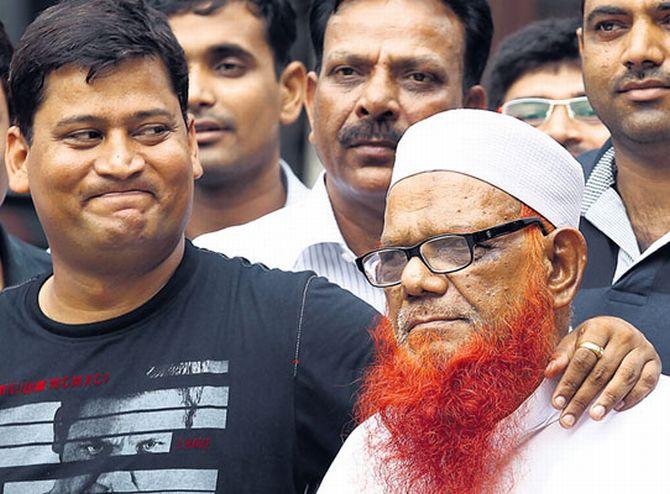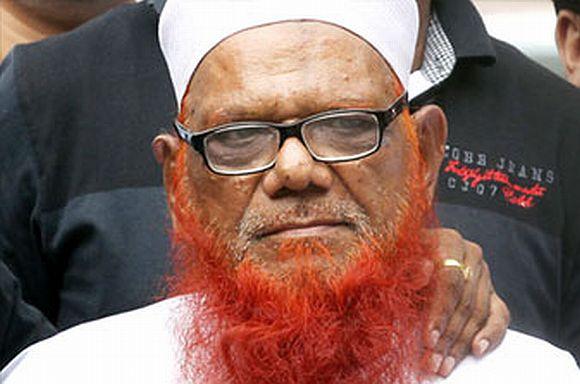 | « Back to article | Print this article |
Carrying out 50 blasts was child's play for them: Cops
Vicky Nanjappa explains why Syed Abdul Karim Tunda, who, the security experts have described as a walking encyclopedia of the Lashkar-e-Tayiba's pan-India operations, is a prize catch for the investigating agencies.
As Syed Abdul Karim Tunda's interrogation continues, the police have uncovered information critical to India's security infrastructure.
The 70-year-old Tunda’s journey into the world of terror has been long enough for him to be described as the ‘grandfather of jihad’ in India.
According to the dossiers prepared by the police and intelligence agencies, Tunda's tryst with terror dates back to 1985.
According to accounts given by his relatives and accomplices, Tunda was never politically motivated. He was drawn towards the Jami’at Ahl-e-Hadis, a religio-political party in Pakistan, and felt the need to create a group that protected the interests of Muslims in India.
Born in Delhi in 1943, he moved to Pilkhuwa in Uttar Pradesh in his teens, but later moved to Maharashtra where to set up a business.
The manner in which he spoke about the Muslim cause was powerful enough for others to believe that he would take the extreme path sooner or later.
He organised a meeting in 1985 after the riots in Mominpura in Nagpur, and during this event, he spoke forcefully about the need to have a ‘force’ to ‘protect’ the Muslims.
One such group was formed in Mominpora.
Click NEXT to read further...
Tunda later became a planner and an executer
Between 1985 and 1992, this group went preaching about the Muslim cause and how the community had to be united against aggression.
The first signs of this group becoming violent was seen post the Babri Masjid demolition in December 1992. They had set up modules in various parts of Maharashtra, Uttar Pradesh and Delhi.
According to his dossier, Tunda had become extremely popular and was called ‘Hakimji’.
The group of extremists had Azam Ghauri and Dr Jalees Ansari, who are key players in the Lashkar-e-Tayiba.
According to the police, their anger and dedication is what made them dangerous.
“Carrying out 50 blasts for them was child’s play,” an intelligence official says.
Tunda’s activities were spotted by Lashkar spotters, who felt he was right to have in its fold.
By late 1995, the Lashkar moved Tunda out of India.
Tunda had friends in organisations like the Jami’at Ahl-e-Hadis and Islamic Students Organisation, who helped him cross over first to Bangladesh from Kolkata. Later, he moved to Pakistan.
He met with Lashkar leader Zaki-ur Rehman Lakhvi in Pakistan, and after spending a couple of months returned to India briefly.
Here he masterminded serial blasts in Delhi, Jalandhar and Rohtak. While assembling a bomb, he lost a hand, earning him the nickname ‘Tunda’, which is slang for handicapped.
According to intelligence sources, Tunda was Lashkar’s expert bomb maker for some time, and later became a planner and executor.
Click NEXT to read further...
Tunda played go-between for Dawood and the Lashkar
His contacts in India like Abu Jundal were of immense help to the Lashkar through which they set up modules.
Tunda is said to be part of a team that oversaw the transition of the Indian Mujahideen from the Students Islamic Movement of India. He is credited with setting up a strong IM module in Maharashtra.
He further helped the Lashkar by playing go-between them and the Dawood Ibrahim network.
Tunda’s arrest is expected to give the police a larger idea about the Lashkar network and its association with Dawood Ibrahim, the fugitive gangster.
The more important aspect would be to probe his domestic links which are still strong.
The biggest worry for any agency is to track the infiltration of terrorists into India. If the police have to get a better picture of how this takes place and who is behind it, then Tunda is their man.
A close look at Tunda’s operations would indicate that he extensively used groups in Maharashtra and West Bengal to further his cause.
Logistical support and escape routes were provided to him by the West Bengal module and his entry and exit into India were usually through this state.
The Kolkata police feel they should question Tunda. An Intelligence Bureau official told Rediff.com that Kolkata has a formidable jihadi network.
The Islamic Chattra Shibir and the Jamiat Ahl-e-Hadis are two groups which specialise in such operations. They have several members across West Bengal, and apart from providing logisitics, help terrorists get in and out of India.
The JaeH in particular has a strong base in Bangladesh and this has been used for several years to assist the infiltration process.
The Kolkata police feel questioning Tunda would reveal more about these groups and their operations in the state.
Tunda had been lying low before his arrest. Age was catching up with the terrorist who had become more of a mentor and guide to fresh recruits to jihad.
TOP photo features of the week
Click on MORE to see another set of PHOTO features...


